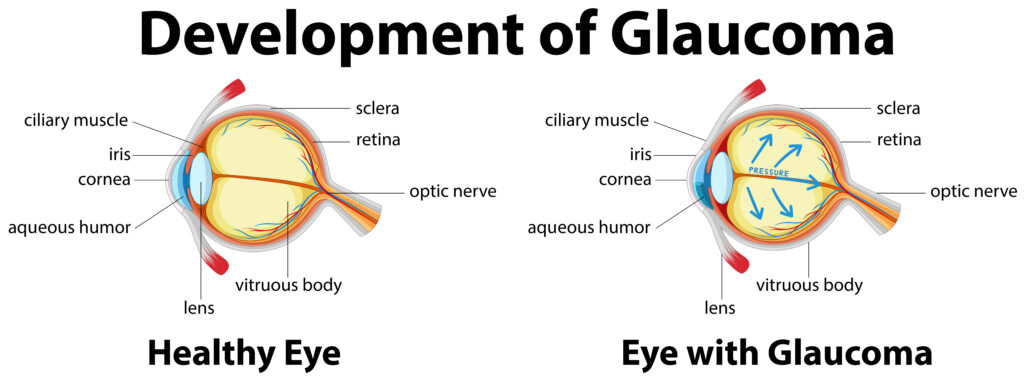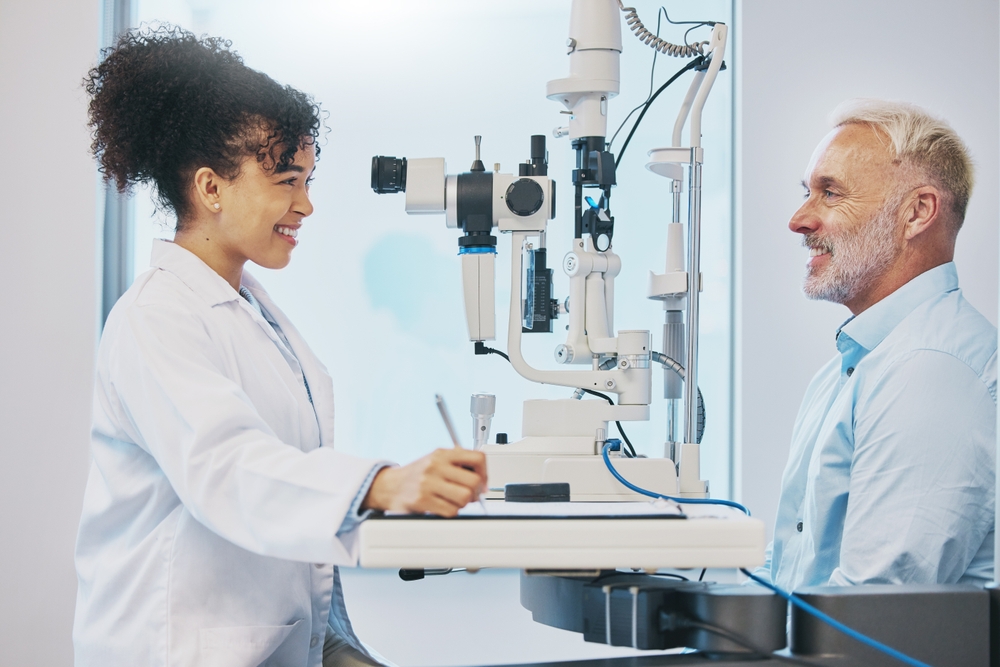Glaucoma is a leading cause of blindness in the U.S. and worldwide. Approximately 4 million Americans have glaucoma, and about half are unaware they have it.
Luckily, prompt detection of glaucoma can help prevent vision loss from this sight-stealing condition. Keep reading to learn more about why early glaucoma detection makes all the difference.
What is Glaucoma?
Glaucoma is a group of eye conditions that damage the optic nerve. The optic nerve, found at the back of the eye, transmits visual information from your eye to the brain, enabling you to see clearly.
Damage to the optic nerve is irreparable and can eventually lead to vision loss. Glaucoma often happens due to elevated eye pressure or intraocular pressure (IOP).

Usually, your eye continuously produces a fluid called aqueous humor. As more fluid enters your eye, an equal amount leaves through the drainage angle, ensuring your IOP remains stable.
However, if there’s a problem with the drainage system and fluid can’t leave your eye as it should, it can accumulate. A buildup of fluid causes high IOP, which can damage the optic nerve and ultimately cause permanent blindness.
What are the Types of Glaucoma?
There are different types of glaucoma, including:
Open-Angle Glaucoma
Open-angle glaucoma is the most common. It tends to develop gradually and occurs when your eye doesn’t drain fluid properly.
Consequently, fluid builds up and increases IOP, which damages your optic nerve.
Angle-Closure Glaucoma
In angle-closure glaucoma, a bulging iris, the colored part of the eye, completely or partially blocks your drainage angle. This can happen gradually or quickly.
The drainage angle sits between your iris and the cornea, or transparent layer at the front of the eye. If it gets completely obstructed, IOP starts to increase.
When this occurs suddenly, it’s known as an acute angle-closure attack and can cause symptoms such as:
- Abrupt blurred vision
- Eye redness
- Severe headache
- Intense eye pain
- Nausea or vomiting
- Halos around lights
Acute angle-closure glaucoma is an emergency. It can cause permanent vision loss if not treated right away. If you have these symptoms, go to the emergency room immediately, then contact your eye doctor.
Normal-Tension Glaucoma
With normal-tension glaucoma, your optic nerve suffers damage even when IOP remains within the normal range. While experts are not sure why some people develop normal-tension glaucoma, it’s believed that the optic nerve may be more delicate in these patients.
Why Does Early Detection of Glaucoma Make All the Difference?
Glaucoma often has no symptoms in the early stages. That’s why half of the Americans with glaucoma don’t know they have it.
The symptoms typically don’t become noticeable until glaucoma has caused irreparable damage. Early detection, through regular eye exams, is critical for preserving your sight.
It allows for timely treatment, slowing or even stopping further optic nerve damage and vision loss, and ensuring a better quality of life.
What Happens When Glaucoma Goes Undetected?
Most forms of glaucoma usually develop painlessly and gradually and can eventually cause progressive vision loss. The optic nerve comprises over a million nerve fibers.
As glaucoma damages these nerve fibers, small blind spots can start to develop in your peripheral or side vision. However, you likely won’t notice these blind spots until most fibers are destroyed.
Your field of vision may continue to narrow as glaucoma progresses, creating a tunnel vision effect. With tunnel vision, you can only see what’s directly in front of you.
Your central vision might also be affected in advanced stages, making it difficult to recognize faces, read, drive, cook, watch TV, and perform other routine activities.
Left undetected, glaucoma can damage all the optic nerve fibers, causing permanent blindness.
How Often Should You Get Your Eye Pressure Checked?

Tonometry is a test that measures the pressure in your eyes, or intraocular pressure. It’s done as part of a comprehensive eye exam.
Tonometry can determine if you’re at risk of glaucoma. However, since you can develop glaucoma even with normal eye pressure, tonometry isn’t the only test used to screen for glaucoma.
It’s combined with other tests to accurately diagnose the condition. If you’re below age 40 and have no known glaucoma risk factors, the American Academy of Ophthalmology recommends a comprehensive eye exam once in your 20s and twice in your 30s.
The next comprehensive eye exam should be done at age 40. For those who are 65 or older, a complete eye exam is essential every one or two years.
If you’re at a higher risk for glaucoma, you’ll need to have your eyes examined more often. Your ophthalmologist will provide a personalized schedule depending on your level of risk and overall eye health.
Ensure you follow your eye doctor’s recommendations to protect your sight from glaucoma. With prompt diagnosis, treatment, and close monitoring, glaucoma can be successfully managed, averting severe vision loss.
Do I Have Glaucoma Risk Factors?
Although anyone can get glaucoma, certain factors put you at a higher risk. These include:

- High intraocular pressure
- Being over age 40
- Family history of glaucoma
- Asian, Hispanic, or African heritage
- Extreme farsightedness or nearsightedness
- Corneas with thin centers
- Past eye injuries
- Thinning optic nerve
- Prolonged use of corticosteroid medications, particularly eye drops
- Certain medical conditions, such as high blood pressure, diabetes, and sickle cell anemia
- Narrow drainage angles, which increase the risk of angle-closure glaucoma
Regular eye exams are the best way to detect glaucoma early if you have any of these symptoms. You may think you don’t need to get your eyes checked if you’re not experiencing any symptoms.
However, the signs of glaucoma are easy to miss, and most people don’t notice any vision changes until substantial optic nerve damage has occurred. Frequent eye exams can help catch glaucoma early, even before you experience any vision changes.
The sooner glaucoma is diagnosed and treated, the greater your chances of preserving your vision.
Safeguard Your Sight from Glaucoma
Protecting your vision from glaucoma starts with getting regular eye exams at Jacksonville Eye Center. Frequent eye exams can help our expert ophthalmologists detect glaucoma early, allowing for timely intervention to prevent severe vision loss.
Has it been a while since you last had your eye exam? Schedule your appointment at Jacksonville Eye Center in Jacksonville, FL, today.

